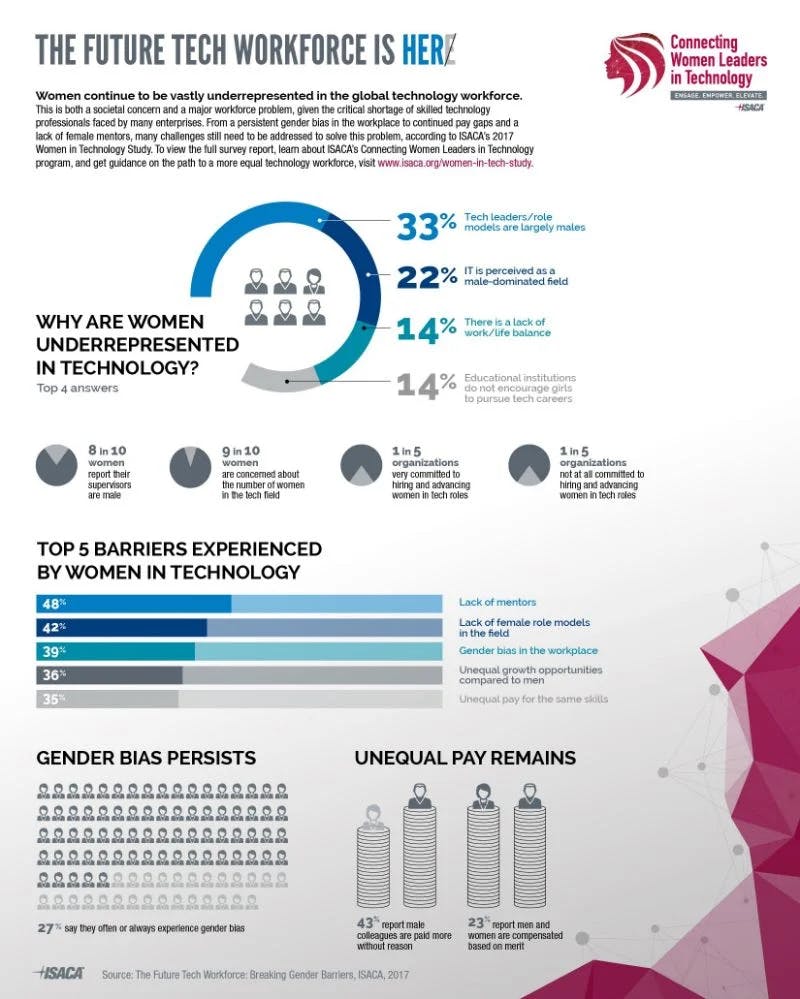Breaking Barriers: Empowering Women in the Tech Industry
Navigating Challenges and Embracing Opportunities
I wrote an article discussing the importance of women in tech, where I shared the Historical Perspective, highlighting how women have showcased their capabilities in this field throughout history. I also discussed the current landscape, including statistics and opportunities for women interested in entering the tech industry. If you haven't read that article yet, I recommend checking it out here.
You can think of this blog post as a continuation of that article, although it's not. After writing the previous piece, I realized there's more to explore on this topic. So, let's delve into it.
Challenges and Barriers
As we all know, we live in a male-dominated society, and gender bias stands out as one of the significant challenges women face, not only in tech but in almost every field. There are many stereotypes surrounding this issue. Many women feel they must work harder to combat these stereotypes and prejudices. Some of the most common challenges faced by women include:
Income Inequality
Now, the biggest myth that persists is the belief that there is no gender-based pay disparity in tech. Sadly, people often find justifications for this. Some argue that differences in roles, working hours, skill sets, experience, or efficiency might lead to women being paid less than men. However, abundant research and studies show that women in the tech industry do face pay disparities compared to their male counterparts. You can read more about the research here.

Fighting Stereotypes
This issue should have been resolved long ago, yet it persists. If a woman encounters stereotypes anywhere, it simply means we've failed as a society. Many people still perceive women as less technically proficient than men and more suited to non-technical or soft roles. Working mothers face additional challenges, including delayed promotion due to maternity leave, a lack of salary increases or bonuses because of pregnancy, and even the risk of being fired upon returning from maternity leave. Many women report feeling they must work harder to prove themselves or fight against stereotypes and prejudices.
Nikita Gupta has shared her personal story of facing persistent questioning about her career choices from her family and society. You can watch her speech on Josh Talks.
Lack of Representation
The tech industry suffers from a significant lack of representation of women, making it daunting for women starting their careers to find role models. Often, they feel like they are the only woman in the room, with no one else to look up to. This lack of representation poses several challenges:
Women may constantly feel the need to prove their competence and justify their presence, which can be exhausting and detrimental to their confidence.
In meetings, they may feel pressured to represent all women in tech and act as spokespersons for their gender, which can be exceptionally taxing and distracting.
Sometimes, they may experience isolation and a sense of not belonging, which can be very demotivating.
How to Overcome These Challenges
These are just a few of the challenges women face, and as a community, we can help them by taking some simple steps. Here are a few things we can do:
Build a support system for women, including mentors and coworkers.
Negotiate your salary from the beginning.
Join professional groups.
Be vocal and advocate for yourself.
Lastly, all men should acknowledge this issue, talk about it, and work towards resolving it.
Success Stories
This section is for women who still feel demotivated and underconfident about their capabilities. Let's read some inspiring stories of women who have made significant contributions to the tech industry, overcoming challenges and achieving remarkable success:
1. Reshma Saujani, Founder of Girls Who Code: Reshma, an engineer and lawyer by training, identified a critical gap in STEM education for girls. She saw a need to empower young females to pursue coding and technology careers and founded Girls Who Code in 2012. Today, the organization has impacted millions of girls globally, changing the landscape of tech for the next generation.
2. Whitney Wolfe Herd, Founder and CEO of Bumble: Whitney co-founded Tinder, a popular dating app, but later left and established Bumble in 2014. Bumble revolutionized the dating space by putting women in control of the first message, fostering a safer and more respectful environment. She became the youngest woman to take a company public in the US at the time of Bumble's IPO in 2021.
3. Jessica O. Matthews, Chief Technology Officer of IBM: Jessica, a physicist by training, is a true leader in the tech industry. She has held various leadership positions at IBM over the years, including leading its Cloud and Cognitive Software division. As CTO, she plays a crucial role in shaping IBM's future at the forefront of technological innovation.
4. Ruha Benjamin, Professor of African American Studies and Sociology at Princeton University: Ruha's work focuses on the intersection of technology, race, and gender. She is a leading voice in advocating for ethical and responsible tech development, addressing issues like algorithmic bias and the impact of technology on marginalized communities.
These are just a few examples of the many inspiring women shaping the tech industry. Their stories showcase the power of perseverance, innovation, and a commitment to making a positive impact on the world. By highlighting their achievements, we can inspire future generations of women to pursue careers in tech and close the gender gap in this ever-evolving field.
Initiatives and Programs
Women in tech are a diverse and growing group of professionals making significant contributions to the industry and society. To address the issues they face, various initiatives, organizations, and programs support and promote women in tech, such as:
Mentorship programs: These programs provide guidance, feedback, and encouragement to women in tech, helping them develop their skills, confidence, and network. Some examples of mentorship programs are Women in Tech® Mentorship, Adobe Research Women-in-Technology Scholarship, and EY Women in Technology program.
Coding boot camps: These intensive and immersive training programs teach women the fundamentals of coding and prepare them for careers in tech. Some examples of coding boot camps for women are Ada Developers Academy, Hackbright Academy, and AllWomen.
Scholarships: Financial awards that help women
pursue their education and career goals in tech. Some examples of scholarships for women in tech are Science Ambassador Scholarship, L’Oréal India For Young Women in Science Scholarship, and BHW Women in STEM Scholarship.
- Diversity initiatives: Efforts to increase the representation, inclusion, and empowerment of women in tech within organizations and the industry. Some examples of diversity initiatives are Women in Tech Global, Women in Tech Report 2024, and Empowering Women in Tech: The Need for Greater Diversity and Inclusion.
These are just some of the many ways women in tech can find support, opportunities, and inspiration. By participating in these programs and initiatives, women in tech can advance their careers and contribute to the innovation and diversity of the industry.
That's all for this article. If you like my work, don't forget to hit that follow button, like this blog, and comment your thoughts. Happy learning. ❤️
